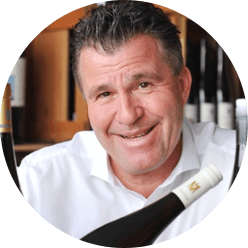Château Margaux is one of the most famous wineries in the world and belongs to the Médoc wine region near Bordeaux. Since 1855, the estate has held the title of Premier Grand Cru, one of the "First Great Growths", which it shares with only three other châteaux in the Médoc today. In this article, we take a closer look at Château Margaux, including its history, location, winemaking and wine.
Table of contents for Château Margaux
- The history of Château Margaux
- The location of Château Margaux
- Terroir and winemaking
- The wines of Château Margaux
- Vintages and ageing
1. The history of Château Margaux
Château Margaux has a long and fascinating history. The estate was first mentioned in the 12th century and belonged to the de Lestonnac family in the 16th century. In the 17th century, the château was acquired by the de Fumel family, who later sold it to the Durfort de Duras family. Finally, in 1977, the Mentzelopoulos family acquired the estate and still runs it today.
Château Margaux is undoubtedly one of the most prestigious wineries in the world. Its history dates back to the Middle Ages and it has overcome many challenges over the centuries. Despite all this, it has maintained its reputation as an outstanding example of French winemaking.
The history of Château Margaux is one of triumphs and challenges. It was first mentioned in the late 15th century under the name Lamothe and had a fortified castle. After numerous changes of ownership, it finally came into the possession of the Pontac family, who also owned Château Haut-Brion, by marriage in 1654. From then on, the wine of Margaux was the first Bordeaux ever to be sold under the estate's name.
Over the centuries, winemaking at Château Margaux continued to evolve. The use of exclusively blue grapes for the red wine as well as the harvest only after the morning dew had dried were groundbreaking innovations. The wine of Margaux quickly achieved fame in England and was appreciated by personalities such as Robert Walpole and Thomas Jefferson.
The French Revolution finally brought an end to the family continuity of the estate. It was confiscated, but was initially able to be bought back by the last heiress of the family. However, she was forced to sell the estate due to the burden of debt. In the following decades, Château Margaux changed hands several times and at times belonged to bankers and trading houses.
In the 1960s, the estate began a slow decline when the owning Ginestet family resorted to less than reputable practices such as blending different vintages. The recession resulting from the 1973 oil crisis increased the pressure on the Ginestet company, and Château Margaux was put up for sale in 1975.
Despite all these challenges, Château Margaux has maintained its reputation as one of the world's leading wineries. Its wines continue to be appreciated by wine lovers around the world and are a symbol of the long tradition and exceptional craftsmanship of French winemaking.
The secret behind Château Margaux's success lies in the passion and dedication that radiates from every step of the winemaking process. From the growing of the grapes to the cellar, every aspect of the process is treated with the utmost care and attention. The result is a unique wine that reflects the soul and character of the land, the region and the estate.
2. The location of Château Margaux
Château Margaux is located in the commune of Margaux near Bordeaux in France. The estate covers 265 hectares, of which 99 hectares are reserved for viticulture. The terroir of the estate is excellent and consists of a homogeneous layer of medium to fine pebbles, four to eleven meters deep, deposited by the Garonne river during the Günz ice age.
3. terroir and vinification
The terroir of Château Margaux is renowned for its excellent red wines. The vines are forced to grow particularly deep roots because the soil is relatively calcareous and water drainage is excellent. Vinification follows the Bordeaux tradition and includes three weeks on the skins in large wooden vats and 18 to 24 months of ageing in new oak barrels.
4. The wines of Château Margaux
Château Margaux is best known for its red wines. The Château Margaux red wine is one of the most expensive wines in the world and has an excellent bouquet and finesse. The longevity of the wine is remarkable, as it usually takes over ten years to fully develop. The estate also produces a white wine called Pavillon Blanc from Sauvignon Blanc.
5. vintages and storage of Château Margaux wines
Some of the best vintages of Château Margaux are 1982, 1983, 1986, 1990, 1996, 2000 and 2005.
Some pictures of our previous wine purchases















